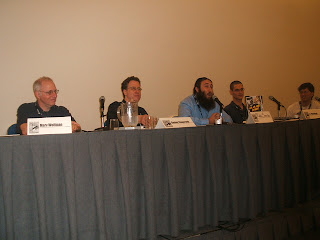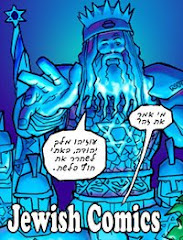
In this 6th (& final) San Diego Comicon report, I will talk about the programming that I attended on Sunday.
I started off the day by attending the Christian Comics Meeting arranged by the Christian Comic Arts Society. That might seem odd to some of you. The way I looked at it : (a) some "Christian"-made comics have plenty of Jewish content in them ; (b) before and after the session, I had the opportunity to show people who were there my copy of JT Waldman's Megillat Esther ; (c) I also had the opportunity to mention to some of the audience members the fact that there would be a "Jewish Side of Comics" panel later that day - in that same room - which would include a discussion of the aforementioned Megillat Esther.
The session started out with group prayer and a sermon. It made me feel somewhat uncomfortable, but I've sat through such things before.
The panel was cool, but I don't remember too much about it (since I'm writing this 6 months later). One thing I do remember is feeling jealous of the fact that the Christian comix community is more organized, cooperative and productive (as a unit) than the Jewish comix community. I asked myself "When will we see the formation of a Jewish Comic Arts Society?"
I was also (quietly) amused at the mention of how there are comics out there which seem religious, but are sacreligious. To me, this seems partly a difference between treating sacred text as complete vs. trying to fill in the gaps ("midrash" in Jewish tradition). Douglas Rushkoff's Testament was singled out as an example, but noone even mentioned A. David Lewis's The Lone and Level Sands despite the fact that the book's artist (Marvin Perry Mann) was selling and signing copies at the Comic-Con.
Following the session, I ate the small lunch that my wife brought over and stayed in the room (Room 4) so that I wouldn't have problems getting into the room for the panel I would be moderating when it was over. The session taking place was "Some Assembly Required: Putting Your Project Together Online". I didn't catch all of it, but what I did get to hear was intriguing, i.e. the ways that modern electronic communication has helped facilitate different aspects of the comics field --- from finding people to work with to building a fan base to publicizing your work via online sample pages of artwork &/or scripts.
I didn't really appreciate what was said about Myspace --- partly due to the fact that I wasn't using Myspace to make connections with others in the comics community. Since then, I have joined both Myspace and Comicspace and I intend to learn how well it can be used to publicize a comics event (specifically the Sunday panel that I'll be moderating at this year's New York Comic Con).
Following that panel, I prepared for the "Jewish Side of Comics" panel. I had a quick chat with the Comic-Con rep (who gave the obligatory reminder about time constraints and hand signals), ate my Comic-Con chocolate (all the presenters got one) and checked the spelling on the large paper name plate wich I now have as a souvenir.
I left souvenir Canadian-made postcards (each depicting one of the Canadian stamps of Canadian-made superheroes) and copies of the hard-to-find Comic Festval Free Comic Book Day comics (made especially for the Toronto Comic Arts Festival).
I had intended to audiotape the session, but the tape recorder I had brought didn't work.

I have vague recollections of what different speakers spoke about. JT Waldman talked about the long process of writing and illustrating his book. Rabbi Simcha Weinstein downplayed the "Jewishness" of specific comic book characters, preferring to talk about the Biblical archetypes that probably influenced their creators. He also made a funny joke about an Orthodox Jew who has achieved superstar status. For some reason I assumed (& dreaded) that he was going to make a reference to Rabbi Schneersohn (aka "The Rebbe"), but he was talking about Matisyahu. Danny Fingeroth read from his manuscript ; I was impressed by his discussion of the Sub-Mariner as being symbolic of the Disapora Jew in exile yearning to re-establish his homeland. I hadn't made that connection before hearing him talk about it. Finally, Marv Wolfman talked about how he came to be the writer of the Homeland graphic history book. I was shocked when he explained that Bill Rubin told him how he thought Marv could write it in a similar way to how he wrote The History of the DC Universe. The reason I was shocked is that I already own a copy of both volumes of that book, but didn't notice the parallels (I had already seen sample pages of Homeland that were online). Marv made a funny comment about how it was harder to write this book becuase he wasn't allowed to use robots or aliens (alas, "I, Gezheh" is just a science-fiction story and the Israelis haven't built a "Big Moishe" yet).

I had asked each speaker to take no more than 10 minutes each and each of them complied. That left over 10 minutes for questions from the audience.

The turnout for the session was better than I'd expected. At least one guy was trying to videotape it and the question-&-answer period was civilized, but lively. Audience member Roy Schwartz even pitched in to help answer a loaded question about Arab-made comics.

Among the celebrities in the audeince (or, at least, those whom I consider to be celebrities) were :
Diana Marsh - illustrator of the mini-comic adaptation of the Jewish folk tale "The Bleeding Tree", which she gave me a free copy of. Unfortunately, I foolishly didn't add her to this panel. I hope to have her on a future panel. I also hope I can get her to submit a story for an anthology of Jewish folk tales in comix format (assuming I can find a publisher who will accept my book proposal).
Corey Sosner - an ex-Canuck who made a Punisher / Wolverine fanfilm called First Round
Liana K - co-host of the Canadian hit show Ed's Night Party
Steve Kirzner - the man behind the puppet known as "Ed the Sock", co-host of the aforementioned Ed's Night Party

I now need to acknowledge the San Diego Union-Tribune, which helped publicize the panel twice, in both its print and online versions. The SDU-T listed the "Jewish Side of Comics" in its list of "What Not to Miss", as well as its list of panels which are part of the theme "Diversity".
What did the bloggers in attendace think of the panel? At this late date (i.e. 6 months later), I think it's safe to say that all the "reviews" are in, so to speak. For the most part, the reviews seem overwhelmingly positive.
The only negative comment I have come across, to date, is that of MeMw|MVPersian :
The day started off a little boring, with a panel for The Jewish side of Comics.
I'm not surprised by his characterization of the panel, though. If one reads his post in full, one finds that he clearly enjoys the sessions dealing with TV, films and video games. That fact is reinforced by looking at which sessions he attended during the Con.
Marv Wolfman, one of the panelists remarked at his blog (July 24th entry):
the Jewish Comics panel which I was certain would be empty ... was actually filled to capacity.
Another panelist, Rabbi Simcha Weinstein, wrote :
It was a real thrill to be on panel with luminaries like Danny Fingeroth, J.T . Waldman and Marv Wolfman. Amid the festivities I also drew attention to the terrible situation in the Israel and gave my blessing that the only evil we should face at this time should be the fictional villains of comic books. The session was well attended and the response super-sonic.

Donald Ensign reported :
I stayed for the Jewish Side of Comics panel. Marv Wolfman and several others were on it. Wolfman is working on a graphic novel (though not straight comics) on the history of Israel.
The Full Metal Teppy wrote :
I ran into ebenbrooks as he left and I arrived. He gave me a hug and asked me how {to get to} the "Jewish Side of Comics" panel to which I was heading.
I'd dressed tznius for the event, which featured Rabbi Simcha Weinstein of the book "Up Up and Oy Vey" about the Jewish origins of Superman. He described how Kal-El means "voice of God" and his origin story parallels that of Moses. His ultimate answer to "Is Superman Jewish?" though is "No way, Jose," because Superman is universal. (Some wag still commented that there are many parallels between Superman and Jesus, and that if Superman is Jesus, then Superman is Jewish.)
Cecile M. Posner Fleetwood, a Comic-Con volunteer and a member of the library committee at Temple Emanu-El in San Diego wrote about the panel on page 6 of the Temple newsletter Ha-Sofer / The Scribe (Acrobat format) :
I was busy as usual, but managed to attend the "Jewish Side of Comics". I'm so glad I did! The session was great! ... The panelists were an interesting blend.

After the panel was over and I breathed a sigh of relief, I stayed in the room for the "Degrassi Graphic Novels" panel. After all, being a Canadian and a fan of all of the incarnations of the TV series, I felt obligated to learn what I could about the upcoming series. it was neat to see the enthusiasm of the show's American fans ; too often, good quality Canadian shows are unknown or ignored by the Yanks.
Halfway through the panel, I left (my wife would later fill me in on what I'd missed) to attend the "H.E.L.P.: Hosting Easy Library Programs" session. Even though I'm no longer a practicing librarian, I still like to see what librarians are doing with comix and graphic novels. I took home some handouts to give to local librarians in Toronto.
By the end of that (3:30-ish), the whole show had only an hour left and there were only 2 sessions left that were not already in progress (neither of which interested me). Thus, I made a mad dash thorugh the exhibit hall to try to locate affordable &/or cheap comics that remained on my "wantlist". I managed to get some, but it required me searching for them and purchasing them whilst hearing over the intercom (along with dozens of other seemingly-oblivious dealers and fanboys) "The Comic-Con is now over! Please exit the exhibit hall now! See you next year!"







No comments:
Post a Comment